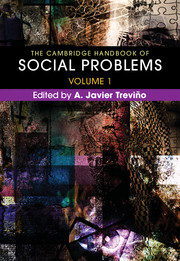Book contents
- The Cambridge Handbook of Social Problems
- The Cambridge Handbook of Social Problems
- Copyright page
- Contents
- About the Contributors
- Introduction
- Part I General Concerns and Orientations in the Study of Social Problems
- Part II Historical and Theoretical Issues in the Study of Social Problems
- Part III Problems of Discrimination and Inequality
- Part IV Problems of Institutions
- Chapter 26 Media and the Construction of Social Problems
- Chapter 27 Family Problems
- Chapter 28 Problems in Education
- Chapter 29 Problems of the Workplace and Workforce
- Chapter 30 Long-Term Unemployment in the United States
- Index
- References
Chapter 28 - Problems in Education
from Part IV - Problems of Institutions
Published online by Cambridge University Press: 16 March 2018
- The Cambridge Handbook of Social Problems
- The Cambridge Handbook of Social Problems
- Copyright page
- Contents
- About the Contributors
- Introduction
- Part I General Concerns and Orientations in the Study of Social Problems
- Part II Historical and Theoretical Issues in the Study of Social Problems
- Part III Problems of Discrimination and Inequality
- Part IV Problems of Institutions
- Chapter 26 Media and the Construction of Social Problems
- Chapter 27 Family Problems
- Chapter 28 Problems in Education
- Chapter 29 Problems of the Workplace and Workforce
- Chapter 30 Long-Term Unemployment in the United States
- Index
- References
Summary
This chapter focuses on three contemporary social problems in education that have received considerable attention from sociologists and educational researchers: educational inequalities between social classes and between ethnic/racial groups and the social impact of the accountability movement in education. These three themes are concerned with how education reproduces social inequalities in society, often through procedures, structures, and the unintended actions of parents, teachers, school staff, and educational policy makers. The findings show that research on these topics is exceptionally rich in terms of theoretical and methodological approaches and debates. Furthermore, although most of the studies have been conducted in Anglo-Saxon countries, increasingly more research is carried out in different countries. This is a promising development, as theories about educational inequality are necessarily context specific, given that educational systems and their social conditions vary widely across national and regional contexts.
- Type
- Chapter
- Information
- The Cambridge Handbook of Social Problems , pp. 513 - 530Publisher: Cambridge University PressPrint publication year: 2018
References
- 2
- Cited by

